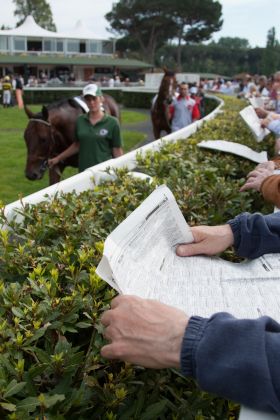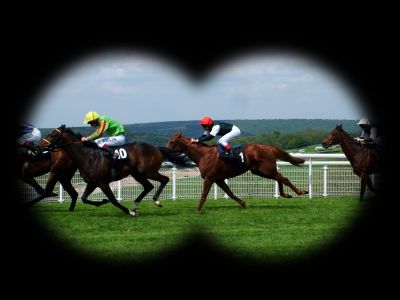
The Southwestern United States is an incredible place for star-gazing. I have lived in many different places in the Southwest -- cities and towns in Arizona, New Mexico, California and Texas. At night the clear Southwestern air reveals millions of stars scattered across the galaxy. I never tire of looking at those stars.
A couple of nights ago, somebody approached me at a casino. He wore a huge smile and had a wild look in his eye. He began rambling about a system he had discovered for winning at the horse races.

'It really works,' he said excitedly. 'I've tested it and it comes out winners every time.'
'Did you test it at the race track or on paper?,' I asked.
He seemed confused. 'Well, on paper. But what's the difference? If it works on paper, it will work at the track or wherever we can bet in those off-track wagering centers.'
My new friend wanted me to go 50-50 with him on testing his system at an off-track betting place. While I haven't invested any money in his system yet, I am giving it serious consideration. I know his system will probably fail. It may work for a little while, but it will eventually collapse as most gambling systems do.
People come up with new systems every day to overcome the odds, whether the game is horse racing, dice, roulette, blackjack, poker or the slots. In fact, according to Janeen, a lovely cocktail waitress who once served me a chilled mango cocktail on the island of St. Kitts, there are nearly as many gambling systems as there are stars in the sky.
I still smile when I remember Harry. He was a middle-aged man with a Russian accent who, with his wife, Nina, operated the Blue Moon Cafe in Phoenix.
The Blue Moon was a small restaurant located on Washington Street about half a mile from the Phoenix Greyhound race track. Harry loved betting on the dogs. He served the best meat loaf dinner in Phoenix (he revealed his secret ingredient to me that made the meat loaf taste so good -- applesauce) and he was absolutely convinced that if he had enough money to wager he could beat the greyhounds.
I asked him how much money he needed to make his system work.
'Oh, around $2,000,' Harry said, refilling my coffee cup. 'Why? Do you want to invest in me?' Nina just shook her head and rolled her deep Russian eyes with a helpless shrug.
While I did not invest in Harry's system, I have come up with several of my own over the years. When I was in my 20s, I found an ad in ARGOSY, a men's magazine that I later wrote for, which advertised something called 'The Little El Paso Handicapping System.' It sold for around $8.95 as I recall and the owner of the system manufactured it in Texas.
The system worked by entering information on a cardboard device. It took about 10 minutes to handicap a single race. You had to collect data on the horse's last finish, how many lengths the animal trailed or led by, and several other factors that were supposed to pull in the winners.
That Saturday, Dave Molina, a copy editor on the Phoenix Gazette where I worked as a reporter, and I went out to Turf Paradise Race Track to test the Little El Paso Handicapping System. Dave and I were good friends and we would even co-author a novel about the newspaper profession (it didn't sell, but we had fun writing it).
We had dates with two attractive flight attendants who worked for American Airlines. They were flying in from Albuquerque and we planned to pick them up at Sky Harbor International Airport for dinner, drinks and dancing at Mr. Lucky's where a young country western singer named Glen Campbell was scheduled to perform.
Dave and I had just got paid and we were eager to discover if the system really worked.
It didn't.
Fueled by Coors, Dave's favorite beer, we worked the information into that little gizmo again and again, only to see our horses run out of the money.
The flight attendants were scheduled to arrive at the airport in an hour. I figured we had only one more race before we had to leave the race track to pick them up.
'What do you say, partner?,' I asked Dave. 'Want to give the Little El Paso Handicapping System a final shot?'
Dave grinned and gave me a high five as he sipped his Coors. 'Why not, Buddy? You can't win if you don't play. Let's go for broke.'

I fed all the information into the system which operated like one of those MapQuest things that gets you from one city to another and lets you know how many miles you are going to travel.
When I dialed the wheel, the system selected a 20-1 shot named Olliman. The race was a mile and a sixteenth and Dave and I decided to wheel Olliman in a $5 quinella. There were 10 horses in the race so it cost us $45 for the bet.
Olliman broke dead last when the gate opened. The horse stayed at the rear of the thundering herd. Dave and I stared at each other with a helpless shrug and began heading for the exit. That was when Olliman started to move.
The horse picked up speed on the far turn and began passing horses. When they hit the finish line in a photo finish, Olliman was on the outside. I thought he finished fourth and mentioned this to Dave. I reached in my pocket for the ticket and was ready to tear it up.
'Don't get rid of the ticket,' a man said. 'I think your horse got second.'
The winning horse had gone off at 40-1. Olliman finished second at 22-1. A $2 quinella paid $320 and our winning ticket was worth $800. That evening, the flight attendants, Dave and I had a great time at Mr. Lucky's. Glen Campbell played and sang 'By The Time I Get to Phoenix' for the first time in public, and it became an almost overnight sensation, earning him a gold record and launching him into prime time. As for The Little El Paso Handicapping System, I don't know what happened to it. If anybody who reads this column has any thoughts on the subject. I'd appreciate hearing from you.
Author: Geno Lawrenzi Jr.
(Geno Lawrenzi Jr. is an international journalist, magazine author and ghostwriter. If you have a unique gambling story to share with him, you may qualify for a cash award. Send your story with all the details to glawrenzi@gmail.com ).
Your feedback
Please enter your comment.
Your comment is added.




